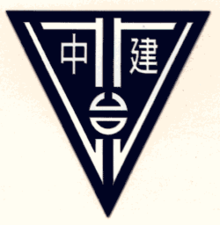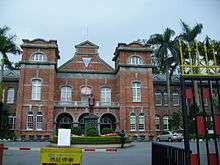Taipei Municipal Jianguo High School
Taipei Municipal Jianguo High School (Chinese: 臺北市立建國高級中學, JGHS; formerly Chien Kuo from the Wade-Giles transliteration) is a public high school for boys located in Zhongzheng District, Taipei, Taiwan. The school was established in 1898 during the early years of Japanese rule. Originally named "No. 1 Taihoku High School" (臺北州立臺北第一中學校), it was the first public high school in Taiwanese history.[2][3] JGHS requires the highest scores on the national senior high school entrance exams[4][5][6] . Its female counterpart is the Taipei First Girls' High School.[7]
| Taipei Municipal Jianguo High School 臺北市立建國高級中學 | |
|---|---|
 | |
| Address | |
No.56, Nanhai Rd. Zhongzheng Dist. Taipei City , 10066 Taiwan | |
| Information | |
| School type | Selective school |
| Established | 1898 |
| Head of school | Jian-guo Xu (徐建國) |
| Grades | 10 - 12 |
| Gender | Male |
| Age range | 16 - 18 |
| Enrollment | 3,101[1] |
| Language | Standard Mandarin (Traditional) |
| Campus | Urban |
| School colour(s) | Khaki |
| Website | http://web.ck.tp.edu.tw |

History
Jianguo High School was the first public high school in Taiwan. Except for a short period following the Chinese Civil War, the school has been an all-boys high school. The red brick building was built in 1909 during Japanese rule and is considered one of Taipei's historical buildings. Originally called Taipei First Boys School, it was renamed in 1946 (along with Taipei Second Boys School) so that the two names would spell out the phrase "successfully establish a country" (建國成功), thus naming them Jianguo High School and Chenggong High School (成功中學). During Japanese rule, because Jianguo was reserved primarily for the Japanese while Taipei Second Boys School allowed entry for the Taiwanese. The two schools developed a competitive nature that persists to this day.
Overview
Students attending the school are widely recognized for their distinctive khaki uniforms and green bookbags. Only the top 1% of scorers on the Basic Competence Test for Junior High School Students (國民中學學生基本學力測驗) receive admission. The school has graduated over 100,000 students in its history. For many international science and math competitions (e.g. the International Science Olympiad), students from Jianguo are chosen to represent Taiwan.[8][9][10][11] As of 2007, students from Jianguo High School have won 46 gold, 63 silver and 21 bronze medals in International Mathematical Olympiad, International Physics Olympiad, International Chemistry Olympiad, International Olympiad in Informatics, and International Biology Olympiad. Since 2000, students from Jianguo have received 11 medals in the IMO/IPhO/IChO/IBO/IOI/IESO per year on average.[12]
Notable alumni
- Alec Su (蘇有朋), singer (Xiao Hu Dui, Solo), actor
- Andrew Yao (姚期智), computer scientist; recipient of the Turing Award in 2000
- Benjamin Hsiao, Chief Research Officer and Vice-President for Research at Stony Brook University, Fellow of the American Physical Society and American Chemical Society
- Calvin Chen (辰亦儒), singer, actor, host
- Chang-Lin Tien (田長霖), former chancellor of the University of California, Berkeley
- Chiang Peng-chien (江鵬堅), the first chairperson of the Democratic Progressive Party
- Fredrick Chien (錢復), former President of Control Yuan
- Eric Chu (朱立倫), former mayor of New Taipei City
- Fu Kun-cheng 傅崐成, former politician[13]
- Huang Wei-cher (黃偉哲),current mayor of Tainan City
- Jeffrey Koo Sr. (辜濂淞), chairman of Chinatrust Commercial Bank[14]
- Kwang-chih Chang (張光直), historian; former Vice President of Academia Sinica
- Lu Hsiu-yi (盧修一), former member of the Legislative Yuan
- Lü Shao-chia (呂紹嘉), conductor
- Lu Yen-hsun (盧彥勳), professional tennis player (formerly #1 in Asia)
- Ma Ying-jeou (馬英九), former President of Taiwan, a Harvard trained lawyer
- Pai Hsien-yung (白先勇), novelist
- Samuel C. C. Ting (丁肇中), physicist; laureate of the Nobel Prize in Physics in 1976
- Su Beng (史明), independence activist and author of Modern History of Taiwanese in 400 Years
- Wei Min Hao (郝慰民), climate scientist and contributor to the Intergovernmental Panel on Climate Change; shared the 2007 Nobel Peace Prize[15][16]
References
- 臺北市政府教育局 (21 Jan 2014). 102學年度臺北市各級學校概況 (in Chinese). Archived from the original on 4 February 2014. Retrieved 28 Jan 2014.
- "History". Jianguo High School. Retrieved 2008-11-09.
- refer to Tokyo First Middle School
- Hirsch, Max (2007-03-08). "Education plan still drawing fire". The Taipei Times. Retrieved 2008-11-09.
- The China Post staff (2007-05-28). "Students finish taking this year's high school aptitude test, find it easy". The China Post. Retrieved 2008-11-09.
- The China Post staff (2007-06-06). "Chinese-language composition gains renewed attention". The China Post. Retrieved 2008-11-09.
- "Taiwan students win two golds at Biology Olympiad - Taiwan News Online". Etaiwannews.com. 2009-07-20. Retrieved 2010-07-11.
- "Taiwan students top winner in International Chemistry Olympiad". Taiwan News Online. 2009-07-28. Retrieved 2010-07-11.
- "Taiwan students win big at science competition". Taiwan News Online. 2010-05-16. Retrieved 2010-07-11.
- "Taiwanese student wins gold at International Mathematics Olympiad". Focus Taiwan News Channel. 2010-07-13. Retrieved 2010-07-13.
- "建中 奧林匹亞高手孕育地". Archived from the original on 2013-04-18.
- "Fu Kun-cheng (3)". Legislative Yuan. Retrieved 23 November 2019.
- Lee, Ke-chiang (2002-09-01). "Koo Yen Pi-hsia, the Luku Incident and White Terror". The Taipei Times. Retrieved 2010-01-27.
- 2008奧運•冠軍論壇嘉賓--郝慰民 (in Chinese). Tianjin ENORTH NETNEWS Co. 2008-04-29. Archived from the original on 2011-07-07. Retrieved 2008-11-09.
- "U.S. Forest Service Scientists Awarded Nobel Peace Prize for Research on Climate Change". U.S. Forest Service. 2007-11-26. Retrieved 2008-11-09.
External links
| Wikimedia Commons has media related to Taipei Municipal Jianguo High School. |